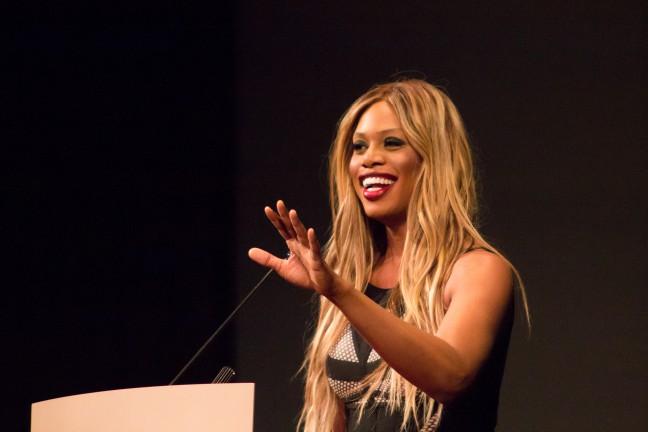Laverne Cox, actress from “Orange is the New Black” and a transgender woman of color, spoke about the importance of LGBTQ+, gender and race equality to more than 1,000 students and community members at Memorial Union Monday.
Her message came the same day U.S. Attorney General Loretta Lynch filed a lawsuit against North Carolina for a bill requiring people to use the bathroom consistent with the gender they were assigned at birth, not the gender they identify with. Cox said she was proud the U.S. is taking a stand against the bill because it could lead to discrimination against transgender people.
To trans folks, "We see you. We stand with you & we will do everything in our power to protect you." Tears again. Thanks @LorettaLynch
— Laverne Cox (@Lavernecox) May 10, 2016
Throughout her life, Cox said she “knew in her heart” that she was a girl, even though she was assigned to the male gender at birth. Now that Cox has transitioned to the female gender, she said she has learned to associate her gender identity with success rather than shame.
“One is not born a woman, but rather becomes one, but it is not guaranteed that the one who becomes a woman is necessarily female,” Cox said. “And ain’t I a woman?”
Society, however, was not always supportive of gender fluidity. Cox said she experienced discrimination, misogyny and racism because she is a transgender woman of color.
When she was in elementary school, she was bullied. Several kids beat her up just because she acted too much like a girl. The church taught Cox that her gender identity was wrong and she was going to hell. Cox said she felt “unlovable.”
After her grandmother died, Cox attempted suicide when she was only 11-years-old because she didn’t want her grandmother to look down on her and be ashamed.
Cox said 41 percent of transgender people attempt suicide compared to less than 5 percent of the of the U.S. population as a whole.
Some demonstrate even more severe hatred toward transgender people, she said. Islan Nettles, another transgender woman of color, was beaten to death in Harlem in 2013 after a man cat called her and realized she was transgender.
Cox said when she walks outside, she always has to wonder if someone will decide if she deserves to exist. Many people on the streets of New York call out to her with racial slurs and cat calls. Others have told her “I think you should die,” yelled out “that’s a man” or have even kicked her.
I'm in line for @Lavernecox @uwmadison. Stretches from theater, out Memorial Union, past Hoofers & beyond. Amazing. pic.twitter.com/9qKOSQTSOz
— Kelly 🧶 Tyrrell (@kellyperil) May 10, 2016
These experiences were deeply painful because society was not affirming her womanhood, she said. Even so, Cox said she has learned to love her big hands, feet, shoulders and height.
“It took me many years to internalize that if someone can look at me and tell that I’m trans, that’s not only okay, that’s beautiful,” Cox said. “Because trans is beautiful.”
More needs to be done to achieve healing and inclusiveness for transgender people and for the LGBTQ+ community as a whole, Cox said.
She said the U.S. census doesn’t collect data on whether or not people are transgender, making them an unknown and marginalized population.
“In … not asking the question we essentially erase, systemically, transgender people,” she said. “We are here, we’ve always been here and we’re not going anywhere, so we need to be counted.”














